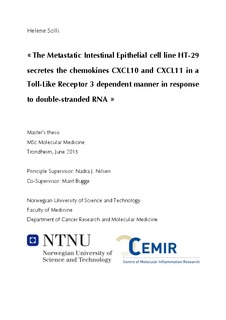| dc.description.abstract | Toll-like receptors (TLRs) are essential sensors of molecules associated with infection,
danger, and stress by host innate immunity. This study investigated the properties of
Toll-like receptor 3 (TLR3) in relation to colon cancer. TLR3 senses pathogen derived
double stranded RNA (dsRNA), endogenous mRNA and the synthetic dsRNA analogue
Poly I:C. The metastatic colon cancer cell line HT-29 was used to observe signalling
outcomes and effects of receptor activation in response to dsRNA. Initially, a cytokine
profiler kit was used in order to determine cytokine secretion in Poly I:C stimulated HT-
29 cells. Stimulated HT-29 showed a potent induction of the chemokines CXCL10,
CXCL11 and CCL20 secretion in this assay. CXCL10 and CXCL11 secretion in HT29
cells upon Poly I:C stimulation was found to be dependent on TLR3, and its adapter
molecule TRIF, by silencing the expression of these proteins by siRNA. TLR3 typically
induce potent IFNβ responses in most cells. Interestingly, HT-29 failed to induce IFNβ
in response to added Poly I:C, although transfected Poly I:C induced a potent IFNβ
response. TLR3 normally resides is the ER, and is dependent on the protein UNC93b1
for trafficking to the endosomes. It has also been reported to be trafficked to the cell
surface in an UNC93b1 dependent manner. Knockdown of UNC93b1 with siRNA
failed to affect CXCL10 and CXCL11 cytokine secretion, indicating that CXCL10 and
CXCL11 secretion is not UNC93b1 dependent. Poly I:C has been reported to induce
apoptosis in a TLR3 dependent manner in several cancer cell lines, but the viability of
HT-29 cells was not affected even at concentrations of Poly I:C. Combined, these
results provide insight into TLR3 expression and signalling in the metastatic intestinal
epithelial cell line HT-29. Taken together, these results imply a possible role for TLR3
in cancer progression. | nb_NO |
